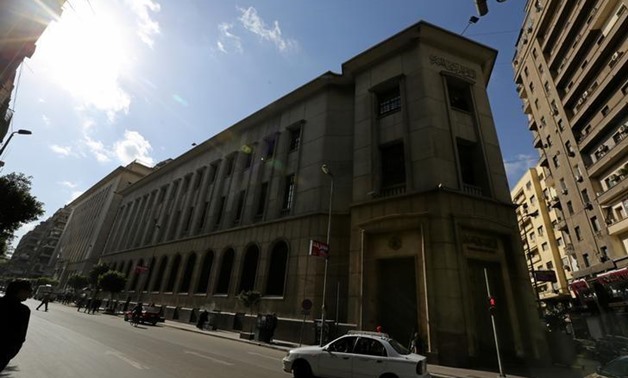
The headquarters of the Central Bank of Egypt in downtown Cairo, Egypt December 27, 2016 – REUTERS/Mohamed Abd El Ghany
CAIRO – 10 January 2018: The significant decline in annual inflation rates in December would encourage the Central Bank of Egypt (CBE) to cut interest rates in February, macroeconomic research consultancy Capital Economics said Wednesday.
Egypt’s annual urban inflation fell to 21.9 percent in December from 26 percent in November, the Central Agency for Public Mobilization and Statistics (CAPMAS) said in a Wednesday report.
The sharp decline in inflation could mean CBE would start easing monetary policy cycle in the MPC meeting in February, Middle East analyst at the London-based consultancy Jason Tuvey said in the research note.
CAPMAS’ breakdown showed that the decline in inflation came in all 12 price baskets, which was either unchanged or fell last month.
A 2.8 percent in the headline rate was caused by food prices, which rose by 25.2 percent year-on-year in December, compared to a 32.3 percent increase in November.
“Accordingly, we think the Monetary Policy Committee (MPC) will embark on an easing cycle when it next meets in mid-February,” Tuvey said, adding that interest rates will be cut by 100 basis points (1 percentage point).
Tuvey also expected inflation to stand at a single digit by the end of 2018, allowing a further cut in interest rates.
Benefiting from the base effect as one year has passed since the flotation of the Egyptian pound, economic analysts expect inflation and interest rates to continue declining over the coming months.
The base effect should be clearer in the upcoming months as the inflation rate for January is expected to be below 20 percent, Minister of Finance Amr El-Garhy told Reuters on Wednesday.
Garhy further anticipated inflation to drop to 13-14 percent by August.
Last month, Egypt’s annual urban consumer price inflation fell to 26.7 percent in November from 30.8 percent in October.
The inflation rate could have been lower that month, but the hike in tobacco prices in late November, which saw a 30-percent increase in cigarettes prices, was large enough to push the item’s contribution in the Consumer Price Index from 1.18 percent in October to 1.4 percent in November.
Consequently, the CBE kept its interest rates unchanged in its MPC meeting in December, setting the overnight deposit rate and the overnight lending rate at 18.75 percent and 19.75 percent, respectively.
Inflation spiked in Egypt since authorities decided to float the pound in November 2016, leading the currency to lose more than 50 percent of its value against the U.S. dollar.
To mitigate soaring inflation, the CBE raised its interest rates by 700 basis points (7 percentage points) since that time to absorb cash liquidity and support local currency.

Comments
Leave a Comment